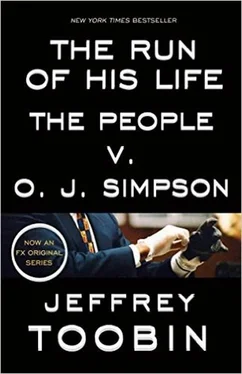“If you would like to take notes on this,” Clark said, “I can leave it up for a little while.”
Not one juror wrote down a thing.

When I left Ito’s courtroom on September 29 and stood before the steam tables in the cafeteria of the Criminal Courts Building, I had only one thought: Praise be-the last lunch (at least before deliberations). Clark’s haggard appearance reflected the feelings of everyone involved with the trial. I ordered my umpteenth chicken burrito and staggered to a table with Sally Ann Stewart, a reporter for USA Today . The room was uncharacteristically deserted for that time of day, and we enjoyed the calm as we discussed the end of the trial and the resumption of our normal lives.
A few moments later, though, Johnnie Cochran, Barry Scheck, Carl Douglas, and Larry Schiller arrived. They set their trays down at a centrally located table, and six Fruit of Islam bodyguards, dressed in their trademark bow ties, formed a circle with their backs to Cochran’s table and their eyes trained warily outward. The guards had first appeared in the courthouse at the beginning of that final week and had added a new level of uneasiness to an environment that was already extraordinarily charged. In truth, Cochran was probably more miser than provocateur. Cochran had received threats, and what really appealed to him about the Fruit of Islam guards was that they had volunteered their services. Still, after the Fuhrman tapes, and after all of his fiery speeches around the country, Cochran had imported into the courthouse the very symbols of Louis Farrakhan’s strident black nationalism. At that Friday lunch, however, the presence of the grim-faced sentries seemed merely ludicrous, for they had only two reporters and Rose, the cashier, to monitor for false moves.
Then, a few minutes later, Robert Shapiro arrived. There had been a time when he was probably the most famous lawyer in America, but by this final Friday, his voluble, visible role had been usurped. Though the other defense lawyers often came and went together, Shapiro arrived and left by himself, and on this day, he paid Rose, took a long look at his colleagues and their sentinels, and sat down by himself at a small table nearby.
Sally and I, feeling a little sorry for him-and always eager to chat with an insider-asked him to sit with us. He picked up his tray, sidled over, and joined in our reveries of life after O.J. His own fantasy, he said, would be to take a month off and join Oscar De La Hoya’s training camp at Big Bear Lake. A serious and skilled amateur boxer at the age of fifty-three, he couldn’t wait to tear into the heavy bag. As always with Shapiro, though, the topic soon turned to his resentment of his fellow defense lawyers. He said he had been appalled when Cochran brought the Fruit of Islam into his entourage and that he had been disappointed by Cochran’s summation the previous day. “It was nothing but race, race, race,” he said. “And why am I not reading that in the paper? All I hear is how great his summation was. Why do I keep reading this?” In truth, some reporters had excoriated Cochran’s appeal for an acquittal based on racial solidarity, but Shapiro’s bitterness was such that he had registered only the favorable words about his colleague.
Meanwhile, Marcia Clark took the Goldman family out for a drink after her rebuttal summation on Friday. She then fled Los Angeles. She took her two boys up the coast to Santa Barbara, to the home of her friend Lynn Reed Baragona. There, Clark slept in peace, played with her kids, and did the crossword puzzle for the first time in more than a year. On Sunday, Clark and Baragona decided to take a trip to the local mall. Amid the upscale stores in that tony Pacific Ocean setting, Clark started to absorb just how famous she had become: As she shopped, she encountered spontaneous outbursts of applause from fellow customers.
Toward the end of the day, Clark and her friend were walking along a long corridor, and a pair of black women started coming toward them from the opposite direction. They were, it seemed, just about the only African-American shoppers in the whole place, and they clearly recognized the Simpson prosecutor. As their paths crossed, one of the black women leaned over and uttered a single word, just loud enough so that Marcia Clark would hear:
“Innocent.”

The jurors selected a foreperson on the afternoon of Friday, September 29, just after Clark completed the last summation. The assignment went to juror number one, Armanda Cooley, a fifty-one-year-old black woman who worked as an administrative assistant for the city of Los Angeles. Cooley was obviously a levelheaded and friendly person, and she had steered clear of most of the jury tempests during the trial. Both sides figured she would be the choice. Judge Ito did not allow the jury to begin considering the evidence on that Friday, however. After they selected the foreperson, Ito sent them back to the hotel; deliberations were set to begin on Monday morning.
Shortly before summations, the sheriff’s deputies supervising the jurors at the Inter-Continental Hotel told their charges that they would have to start preparing for the end of their sequestration. Through eight months at the hotel, the jurors had accumulated a great many possessions in their rooms. The deputies told them that by the time of deliberations, all of their belongings would have to fit into one or two suitcases.
Over the last weekend, the deputies made an additional announcement to the jurors. On Monday, and on each day of deliberations to follow, the jurors would be required to pack all of their remaining belongings and take them to the courthouse. This was a major imposition. It also made no sense, because once the jurors reached their verdict, Ito had decided that he was going to delay the announcement overnight. Yet the jurors, beaten down after so many months of confinement, did not protest. They accepted the prospect of rising daily at dawn and packing, then rushing off to court at their usual 7:45 A.M. for as long as it would take to reach a verdict. But this pointlessly strict policy by the sheriff’s deputies represented at least a subconscious cue to the jurors to reach a quick decision.
At 9:16 A.M. on Monday, October 2, the twelve members of the jury settled into chairs in the deliberation room just across the back hallway from Ito’s courtroom. Twenty-five minutes later, Ito’s clerk, Deirdre Robertson, wheeled in a cart piled high with trial exhibits arrayed in black binders. Robertson closed the door and said the jurors could begin discussing the case.
Armanda Cooley, the foreperson, asked her colleagues for advice about how to proceed. She had never before served on a jury. Several of the jurors suggested that they take an immediate straw poll. But Cooley said that a manual she had been given seemed to suggest that the jury should not call for a show of hands. After a little more discussion, it was agreed that Cooley would conduct a vote by secret ballot, just to get a sense of what everyone was thinking.
“Just write ‘guilty’ or ‘not guilty’ on a piece of paper and put it in the bowl,” Cooley said. After a moment or two, Cooley passed around a glass bowl that Ito’s clerks had kept full of candy over the previous months. When the bowl came back to Cooley, her friend Carrie Bess-like Cooley, a single black woman with grown children and a civil-service job-volunteered to tabulate the responses on a blackboard. Cooley called out the votes, and Bess wrote them down:
Ten for acquittal; two for conviction.
Turning for the first time to the facts of the case, Anise Aschenbach (the defense’s white “demon”) announced she wanted to say something. She had been stewing all weekend. Aschenbach had been so angry during Cochran’s summation that she almost got up and told the lawyer to shut up. “I was so outraged at what he said,” Aschenbach told her fellow jurors. “He wants us to send the LAPD a message. Does he think we’re so stupid that we’re going to send a message rather than decide based on what we heard in the case? I hope I was not the only one offended by his remarks.”
Читать дальше














